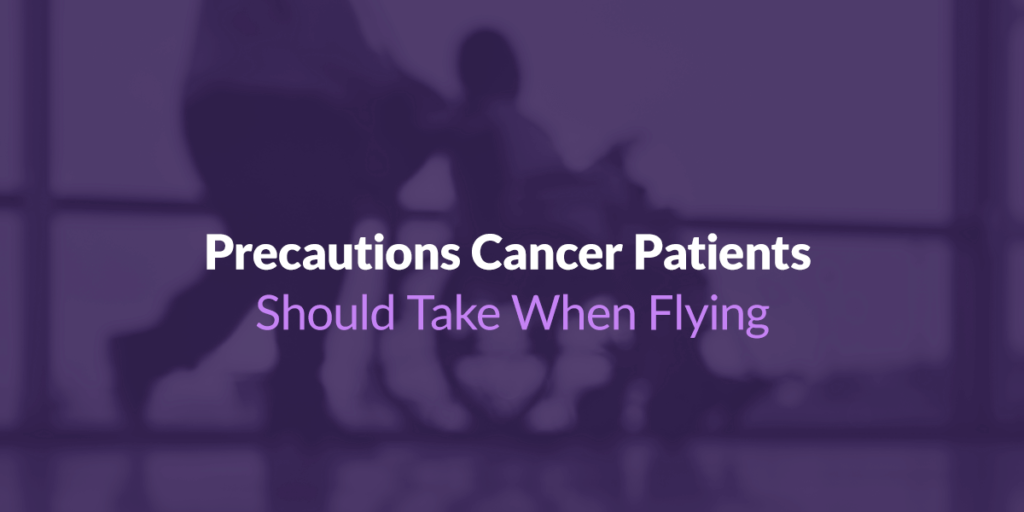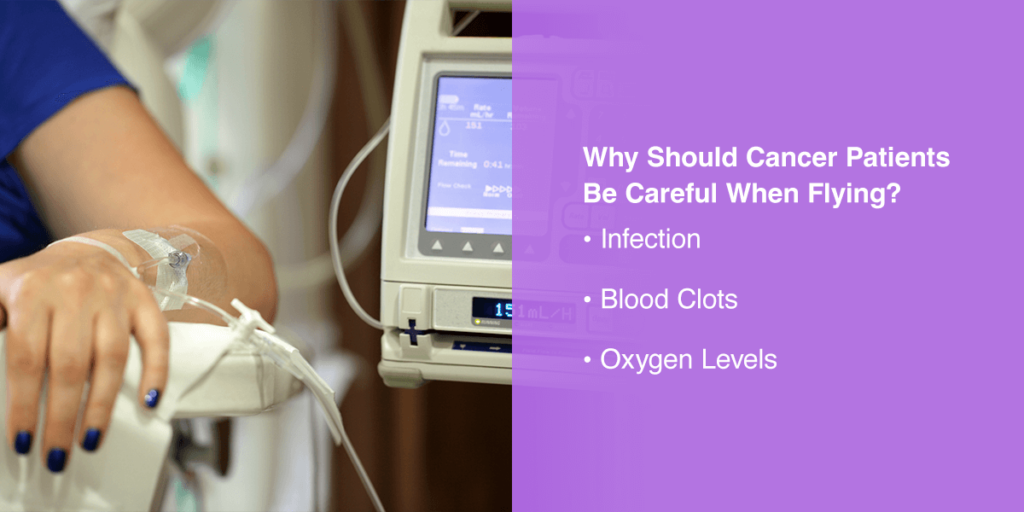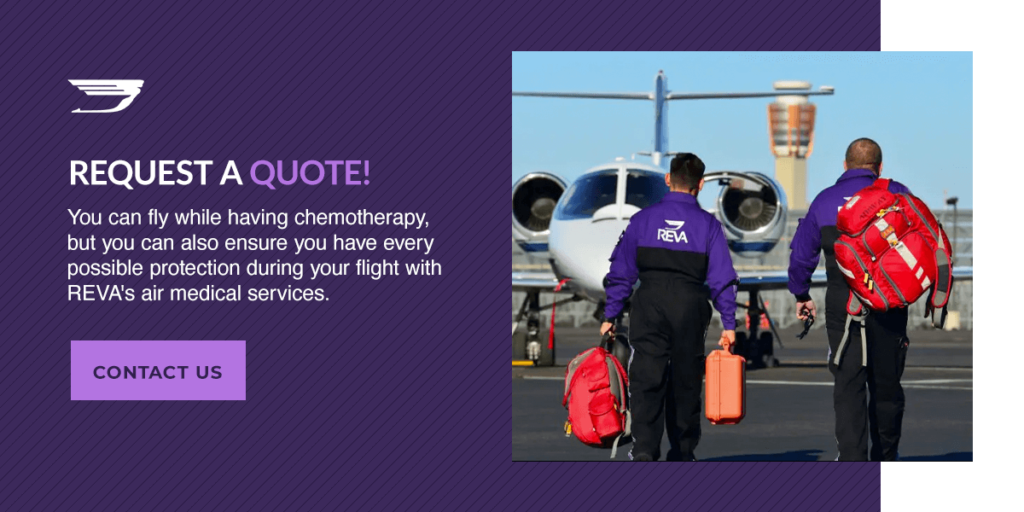Blog
STAYING ON THE FOREFRONT OF MEDICAL AIR TRANSPORTPrecautions Cancer Patients Should Take When Flying

If your doctor has diagnosed you with cancer, you might have to travel across the country to receive the treatment you need. Other times, you may want to enjoy vacationing with your family. Whatever your circumstances may be, traveling as a cancer patient may require specific precautions before, during and after air travel.
If you or a loved one is undergoing cancer treatment, you might have questions and concerns about traveling, especially by plane. Whether you need medical transport or medical escort services, learn more about air travel during chemotherapy and other cancer treatments with REVA.
Can You Travel by Plane During Chemo?
Cancer patients can travel by airplane, usually with minimal risk. If you are stable, have healed from any procedures or surgeries and have high enough white blood cell and platelet counts, you should have no issues flying. However, whether you’re in your best shape or still working toward feeling better, it’s still wise to visit your oncologist to discuss potential concerns, like how soon you can fly after chemo.
Whether you can travel while on chemo depends on a few factors. Chemotherapy and flying concerns you’ll want to discuss with your doctor include the following.
- Timing: If you are in treatment, ensure your travel plans do not conflict with any crucial procedures or checkups. You also want to talk to your health care team to schedule your travel far enough away from any significant surgeries or treatments that will require recovery time.
- Medications: Review your list of medications with your doctor to ensure you’ll have access to everything you need while you travel. If you start a new prescription or treatment plan, avoid traveling for a while to ensure you don’t have an adverse reaction while you’re away from home.
- Risks: Your doctor can advise you on any possible hazards you may encounter on your trip, which could include blood clots, oxygen, air pressure changes and infection. Additionally, ask your doctor about the risks of traveling in between chemo treatments.

Why Should Cancer Patients Be Careful When Flying?
There are many reasons cancer patients should take precautions when flying. Air travel during chemotherapy comes with some significant risks you should carefully consider before making a final decision.
Infection
The most significant danger of travel for people with cancer is a compromised immune system. Because air travel requires you to sit near people who are coming from all over the country — or even the world — you are at higher risk of infection whenever you step on a plane. You can take precautions like bringing sanitizer and disinfecting wipes and wearing a high-quality mask for maximum protection.
Blood Clots
Cancer and air travel are two risk factors for developing blood clots. If you have a history of blood clots, speak to your health provider about whether air travel is safe for you. You can also do a few things to prevent blood clots on planes, such as walking around every hour, wearing specialized compression socks and taking medications.
Oxygen Levels
At higher altitudes, the body has a lower oxygen saturation level. People without health complications will naturally adapt, and it won’t usually pose a problem. However, those lower oxygen levels can pose significant hazards for cancer patients, especially people with respiratory issues from COPD or lung cancer. Even if you don’t need oxygen on the ground, talk to your doctor about having it available for your plane trip.
How Soon After Chemo Can You Travel?
Depending on your individual treatment, you may be able to fly during chemotherapy. However, some doctors advise their patients to wait until chemo is finished.
Once you complete chemotherapy, you may be advised to wait up to a month before you travel, depending on the specific treatment you received. Chemo can lower your platelet count and increase the risk of bleeding, so your doctor may recommend avoiding flying if your platelet count is low.
Speak with your treatment team to find out how long you should wait before traveling. Your doctor can help you determine when your white blood cell count will likely be lowest, as low levels increase vulnerability to infection. Low white blood cell count typically occurs between seven and 10 days after a chemo dose and may last up to a week.
Travel Precautions for Cancer Patients
If you or your loved one are planning to travel by plane during cancer treatment, you should take some precautions to prepare yourself to fly.
1. Pre-Travel Arrangements
Before you even buy your tickets, make some arrangements to ensure you are as safe as possible. At this stage, it can help to have a calendar dedicated to everything related to your appointments and treatments. If you have any procedures or surgeries or start a new medication soon before your intended trip, ensure you don’t overexert yourself.
2. Prepare for Security
Once you have your ticket, you’ll want to research and prepare for airport security. Going through TSA as a cancer patient can be complicated, but there are many resources to help you. You can contact TSA directly to learn more about the screening process and how to make your time in security as smooth as possible. Here are a few critical airport security tips to remember.
- Arrive early to ensure you have plenty of time to make it through security and get to your gate for boarding.
- Establish whether you will need to bring liquid medications with you on the plane and follow the approved process for that.
- Get a health provider’s signature if you will need to carry syringes with you on board.
- Avoid traveling with medical marijuana or CBD oil outside the United States.
- Speak with a TSA agent about any medical devices that may require special security proceedings.
3. Have Medications and Supplies on Hand
In general, you always want to travel with your prescriptions in your carry-on bags. When flying as a cancer patient, it’s vital to have all your medical supplies and medications on hand. Accidents happen, and airlines may lose or misplace your checked baggage. Keeping these necessities with you will help you prepare for any issues during the flight and ensure you’re never without what you need.
4. Bring Accessories to Enhance In-Flight Comfort
In addition to gathering all the necessary medical supplies, bring accessories to make your journey more comfortable. Dress in lightweight, layered clothes in case of delays, and consider what might make you comfortable while on the plane.
For example, if you have any soreness in your stomach, have a pillow or blanket to provide some cushioning from the seat belt. Additionally, bring healthy snacks and drinks that may help with any travel sickness you might experience.
5. Speak With the Flight Crew
When you get to the gate after making it through security, you may also want to check in with the flight crew to let them know of any special considerations. If you are in a wheelchair or need more time boarding, you can arrange to board before other passengers. Also, tell the crew if you need to get up and walk around during the flight to prevent blood clots.
6. Use REVA’s Air Medical Services
You can rely on REVA’s air medical services to ensure maximum air travel safety as a cancer patient. Whether you opt for an air ambulance or medical escort, REVA will take care of all your needs. We cover paperwork and documentation and provide experienced flight crews, transportation and medical attention. Fly with an expertly trained medical team with bedside-to-bedside service to ensure you have safe, efficient and compassionate air travel across the country or overseas.
Request a Quote!
You can fly while having chemotherapy, but you can also ensure you have every possible protection during your flight with REVA’s air medical services. To request a quote, fill out our quick and easy contact form or call us at 1-877-861-7382.

